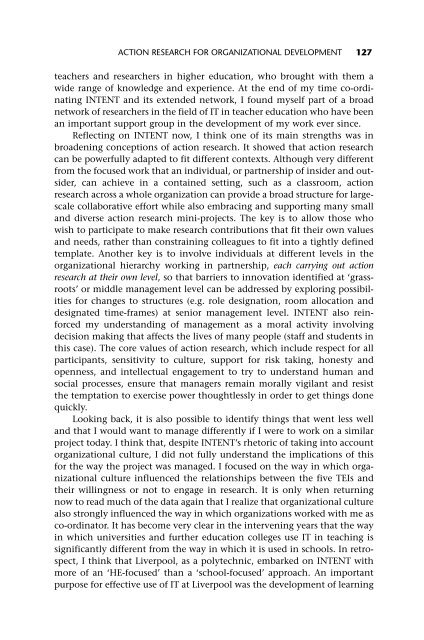Action Research A Methodology for Change and Development
Action Research A Methodology for Change and Development
Action Research A Methodology for Change and Development
You also want an ePaper? Increase the reach of your titles
YUMPU automatically turns print PDFs into web optimized ePapers that Google loves.
ACTION RESEARCH FOR ORGANIZATIONAL DEVELOPMENT 127<br />
teachers <strong>and</strong> researchers in higher education, who brought with them a<br />
wide range of knowledge <strong>and</strong> experience. At the end of my time co-ordinating<br />
INTENT <strong>and</strong> its extended network, I found myself part of a broad<br />
network of researchers in the field of IT in teacher education who have been<br />
an important support group in the development of my work ever since.<br />
Reflecting on INTENT now, I think one of its main strengths was in<br />
broadening conceptions of action research. It showed that action research<br />
can be powerfully adapted to fit different contexts. Although very different<br />
from the focused work that an individual, or partnership of insider <strong>and</strong> outsider,<br />
can achieve in a contained setting, such as a classroom, action<br />
research across a whole organization can provide a broad structure <strong>for</strong> largescale<br />
collaborative ef<strong>for</strong>t while also embracing <strong>and</strong> supporting many small<br />
<strong>and</strong> diverse action research mini-projects. The key is to allow those who<br />
wish to participate to make research contributions that fit their own values<br />
<strong>and</strong> needs, rather than constraining colleagues to fit into a tightly defined<br />
template. Another key is to involve individuals at different levels in the<br />
organizational hierarchy working in partnership, each carrying out action<br />
research at their own level, so that barriers to innovation identified at ‘grassroots’<br />
or middle management level can be addressed by exploring possibilities<br />
<strong>for</strong> changes to structures (e.g. role designation, room allocation <strong>and</strong><br />
designated time-frames) at senior management level. INTENT also rein<strong>for</strong>ced<br />
my underst<strong>and</strong>ing of management as a moral activity involving<br />
decision making that affects the lives of many people (staff <strong>and</strong> students in<br />
this case). The core values of action research, which include respect <strong>for</strong> all<br />
participants, sensitivity to culture, support <strong>for</strong> risk taking, honesty <strong>and</strong><br />
openness, <strong>and</strong> intellectual engagement to try to underst<strong>and</strong> human <strong>and</strong><br />
social processes, ensure that managers remain morally vigilant <strong>and</strong> resist<br />
the temptation to exercise power thoughtlessly in order to get things done<br />
quickly.<br />
Looking back, it is also possible to identify things that went less well<br />
<strong>and</strong> that I would want to manage differently if I were to work on a similar<br />
project today. I think that, despite INTENT’s rhetoric of taking into account<br />
organizational culture, I did not fully underst<strong>and</strong> the implications of this<br />
<strong>for</strong> the way the project was managed. I focused on the way in which organizational<br />
culture influenced the relationships between the five TEIs <strong>and</strong><br />
their willingness or not to engage in research. It is only when returning<br />
now to read much of the data again that I realize that organizational culture<br />
also strongly influenced the way in which organizations worked with me as<br />
co-ordinator. It has become very clear in the intervening years that the way<br />
in which universities <strong>and</strong> further education colleges use IT in teaching is<br />
significantly different from the way in which it is used in schools. In retrospect,<br />
I think that Liverpool, as a polytechnic, embarked on INTENT with<br />
more of an ‘HE-focused’ than a ‘school-focused’ approach. An important<br />
purpose <strong>for</strong> effective use of IT at Liverpool was the development of learning

















